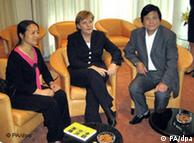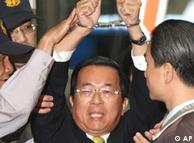1127
cnn bbc
從不到十人死
幾鐘頭之後 到七十餘人死
周三晚間在印度金融之都孟買的七個地點發生一系列協調一致的槍擊事件,導致至少80人喪生,250多人受傷。 受到攻擊的地點包括孟買的兩家頂級酒店奧布羅伊飯店和泰姬陵飯店。
此外,孟買的主要火車站和一家醫院也受到攻擊。
在奧布羅伊飯店外的本台BBC記者說,兩名槍手在裡面僵持,大約40名客人被困在那裡。
據報,孟買反恐機構負責人與另外兩名高級警官在交戰中被打死。印度警方說,有四名槍手被打死,九人被抓。
恐怖襲擊
一個先前沒有聽說過的自稱為德乾聖戰者的組織宣稱對攻擊事件負責。該組織向多個新聞機構發送了一系列電子郵件。
警方說,當地時間周三23點槍手在該市的七個地點發動攻擊。攻擊者使用自動步槍和手榴彈。
正在印度訪問的一名歐洲議會議員告訴本台BBC說,他看到一名槍手在他面前開槍,好幾個人隨即倒在地上。
 攻擊造成近80人喪生,200人受傷。 |
據報,槍手還在泰姬陵飯店扣押了一些西方人質。
一名目擊者告訴當地電視台說,槍手專挑拿英國或美國護照的人攻擊。這名男子說,他們要的是外國人。
國際譴責
美國強烈譴責了周三發生在孟買的一系列攻擊事件。但美國國務院尚不清楚有沒有美國公民在攻擊中受到傷害。
在華盛頓的國務院說,美國願意向印度政府提供幫助。
白宮正在密切關注事態的發展。
英國首相布朗稱這些攻擊是令人髮指的,並說將會對攻擊做出毫不留情的回應。
2006年七月,孟買曾發生過一系列攻擊,導致將近190人喪生,700多人受傷。
當時,攻擊者在上班高峰時間引爆安放在火車上的炸彈。
印度警方指責巴基斯坦情報機構策劃了那次由一個激進伊斯蘭團伙發動的攻擊。
但巴基斯坦否定了這一指控。並說沒有證據顯示它的情報人員捲入了這些攻擊。
By SOMINI SENGUPTA 56 minutes ago
Some reports set the death toll as high as 80 in coordinated terror attacks aimed at luxury hotels, a train station, a movie theater and a hospital.
wsj
孟買襲擊事件追凶 印巴緊張關係加劇
印
度商業中心孟買的恐怖襲擊事件在經過60小時的清剿行動後於上週六平息。印度負責國內安全事務的最高官員引咎辭職。與此同時﹐隨著印度與巴基斯坦在襲擊事件幕後主使問題上不斷相互指責﹐兩國間的緊張關係加劇。
週 日﹐當死者遺體還在源源不斷的從泰姬陵酒店(Taj Mahal Palace & Tower)向外運出時﹐印度內政部長因為對週三發生的這次襲擊負有“道德上的責任”而引咎辭職﹐財長齊丹巴蘭(Palaniappan Chidambaram)被任命為新的內政部長。
新任內政部長齊丹巴蘭將成為印度國內安全事務的最高長官。不過本屆政府明年5月便屆滿﹐在此之前印度必須舉行議會選舉。
近幾個月來﹐印度發生的恐怖襲擊活動日漸頻繁。該國反對派猛烈抨擊政府的毫無準備和失職。
齊丹巴蘭的前任--希夫拉吉•帕蒂爾(Shivraj Patil)因為今年先後在新德里、捷布和阿薩姆邦發生的炸彈襲擊而受到嚴厲指責。
在孟買﹐警方在面對準備充分且火力強大的恐怖分子時也顯得裝備和訓練都不到位。即便是後來投入的精銳特種部隊﹐在對付相對少數的襲擊者時也顯得吃力﹐且花了兩天多時間才完成清剿任務。但就連這隻兩百人的特種部隊也是在襲擊發生9個小時後方從新德里空運過來的。
而就在恐怖襲擊事件發生之時﹐印度與地區內的主要對手巴基斯坦的關係也正變得日益緊張。印度當局稱﹐初步調查顯示﹐孟買的襲擊活動與巴基斯坦武裝組織有牽連。照印度方面所稱﹐至少一部分襲擊者是從巴基斯坦經海域發動的襲擊。
據伊斯蘭堡方面稱﹐巴基斯坦總理吉拉尼(Yousuf Raza Gilani)已取消本週對香港的訪問計劃﹐以應對這次襲擊事件以及仍在加劇的印巴緊張關係。
巴基斯坦安全部門一位高級官員上週六警告稱﹐倘若巴基斯坦感覺受到印度威脅﹐便要將打擊基地組織(al Qaeda)和塔利班(Taliban)武裝的部隊部署至印巴邊境。
週日﹐印度當局仍在從泰姬陵酒店運出屍體﹔三名穆斯林武裝嫌犯在此進行了最後的抵抗﹐直至上週六被印度特種部隊擊斃。
眼下泰姬陵酒店被金屬路障重重封鎖﹐這家外國遊客和印度高層社會昔日經常光顧之地如今遍地殘垣﹐殘破焚毀的窗戶已被封上。
一個之前鮮為人知的穆斯林武裝組織“德干聖戰組織”(Deccan Mujahideen)向本地媒體發送信息﹐宣稱對襲擊事件負責。但印度官員表示﹐目前在押的一名武裝分子是來自巴基斯坦。
印度官員提到關於武裝分子的最新細節引發了關於他們訓練和籌備的更多疑問。據美聯社報導﹐恐怖分子裝備有精良的自動武器和手榴彈﹐還有GPS設備、手機和衛星電話等通信工具。
印度有關部門表示﹐至少一部分恐怖分子是乘坐一艘拖撈船抵達孟買﹔襲擊開始一天後﹐這艘船被發現廢棄在海灘上﹐船內還有一具被捆綁著的屍體。印度政府懷疑恐怖分子隨後轉乘小艇並在重要襲擊目標附近登陸。
目擊者表示﹐一些恐怖分子有意識地在外國人經常光顧的孟買商業中心的酒店和其他場所搜尋美國和英國公民。
在襲擊事件中遇難的還有來自德國、加拿大、以色列、意大利、日本、中國、泰國、澳大利亞、馬來西亞和新加坡等國公民。
此次危機暴露出了印度在打擊恐怖主義問題上面臨的巨大挑戰。目前仍有許多此次襲擊事件的重要問題尚未弄清﹐包括恐怖分子的身份和國籍﹐他們如何發動襲擊的細節﹐以及是否有恐怖分子逃脫等等。
一位美國官員表示﹐美國政府已經向孟買派出一個小組協助進行調查。他沒有透露有關調查小組規模的詳細信息﹐也拒絕公佈如何協助印度調查人員的具體情況。
此次襲擊事件不同尋常﹐這並不僅僅是因為他們顯然經過精心準備和週密實施﹐還因為襲擊者扣留了人質﹐卻沒有提出任何正式要求。安全專家表示﹐襲擊者似乎有意製造一起漫長複雜的攻堅戰以造成最大的傷亡﹐吸引全球數天的注意力。
據報導﹐此次遭到襲擊的場所有數家豪華酒店、一家餐館、警察總部和一個火車站。
印度負責搜集國際情報的機構調查分析局(Research and Analysis Wing)前局長索德(Vikram Sood)表示﹐武裝分子為此進行了攻擊、佔領和死守的週密設計﹐這種襲擊模式可以被複製在任何其他場所。
兩名襲擊猶太人中心和一家酒店的武裝分子據稱曾打電話給印度電視台﹐就印巴分治的克什米爾地區的穆斯林待遇提出抱怨。
但 調查人員也不排除有其他國家公民參與襲擊事件的可能性﹐同時也可能有本地人為恐怖分子提供了支持。警方從恐怖分子遺留在泰姬陵酒店的一個背包中發現了一張 毛里求斯政府簽發的身份證。特種部隊還復原了七張信用卡﹐這些卡來自諸多印度銀行和在印度有業務的跨國銀行﹐既有印度盧比也有美元帳戶。
據信虔誠軍和穆罕默德軍這兩個恐怖組織和基地組織有聯繫。他們已經發展成為印控克什米爾地區一隻伊斯蘭叛軍的戰鬥主力。克什米爾地區主要人口為穆斯林﹐目前由印度和巴基斯坦分別控制。
Peter Wonacott / Matthew Rosenberg / Jackie Range / Krishna PokharelTensions Mount As India Seeks Answer To Attacks
India's top security official resigned and tension with Pakistan escalated amid growing recriminations over who is to blame for the deadly 60-hour-long attack on India's commercial capital that ended Saturday.
On Sunday, with corpses still being pulled from the landmark Taj Mahal Palace & Tower hotel, India named Finance Minister Palaniappan Chidambaram to be home affairs minister, after the incumbent stepped down to take 'moral responsibility' for the attacks, which began Wednesday night.
Indian Prime Minister Manmohan Singh's Congress party-led coalition government faces mounting criticism for failing to prevent or quickly end the attacks, which Indian officials have suggested involved Islamist militants trained in Pakistan.
The only gunman captured by police after the attacks told authorities he belonged to the Pakistani militant group Lashkar-e-Taiba, a senior police officer said Sunday, according to the Associated Press.
Joint Police Commissioner Rakesh Maria said the assailant told police the group had intended to hit more targets during their attacks. 'Lashkar-e-Taiba is behind the terrorist acts in the city,' Mr. Maria told reporters. 'The terrorists were from a hardcore group in the L-e-T.'
A U.S counterterrorism official said that the information being learned in the investigation continues to point to a Lashkar-e-Taiba connection. He said the 'working assumption' of the U.S. government that L-e-T and another Pakistani militant group, Jaish-e-Mohammed, are behind the attacks continues to hold up. 'It does seem consistent with that, even if you still don't have final definitive conclusion being drawn,' a U.S. counterterrorism official said, who declined to speak to specific details.
At least 174 people were killed in the assaults on 10 locations in Mumbai, including the iconic 105 year-old Taj Mahal, the luxury Oberoi and Trident hotel complex, and a local Jewish center. At least 18 foreigners, including six Americans, were among the victims, according to the Associated Press.
The attackers held an unknown number of people hostage during their siege of the hotels and the Jewish center, known as Chabad House. At least some of those held were later killed.
The death toll was revised down Sunday from 195 after authorities said some bodies were counted twice. But they said it could rise again as areas of the Taj Mahal were still being searched. Nine gunmen were killed and one captured, security officials said.
The new home minister, Mr. Chidambaram, will take India's top security post as the government faces a parliamentary election that must be held by next May, when its term expires.
The government has been blasted by political opponents for being unprepared and inept at dealing with increasingly frequent instances of terrorism in recent months.
Mr. Chidambaram's predecessor, Shivraj Patil, had been heavily criticized after terrorist bombings in New Delhi, Jaipur and the state of Assam this year.
In Mumbai, police responding to the initial attacks also appeared ill-equipped and ill-trained to deal with the apparently well-prepared and heavily armed terrorists. Even when India's elite military commandos took over -- and ultimately brought the siege to an end -- they struggled for more than two days to root out a relatively small number of attackers. And the 200 commandos who eventually prevailed had to be flown in from New Delhi and didn't arrive at the scene of the attacks until about nine hours after they began.
The developments came as strains with South Asian arch rival Pakistan increased. Indian officials have said that initial investigations of the Mumbai attacks linked them to Islamist militants, at least some of whom allegedly launched their assault by sea from predominately Muslim Pakistan.
Pakistan Prime Minister Yousuf Raza Gilani canceled a scheduled trip to Hong Kong this week to deal with the attacks and rising tensions with India, officials in Islamabad said.
A senior Pakistani security official warned Saturday that troops would be diverted from its war against al Qaeda and Taliban militants and deployed on the Indian border if Pakistan felt threatened by its neighbor.
On Sunday, authorities were still removing bodies from the Taj Mahal, where three suspected Muslim militants made a last stand before Indian commandos killed them in a blaze of gunfire and explosions Saturday.
The Taj Mahal, popular among foreign tourists and Indian high society, was surrounded by metal barricades, its shattered and fire-scorched windows boarded over.
A previously unknown Muslim group called Deccan Mujahideen has claimed responsibility for the attacks in a message to local media. But Indian officials have said a surviving gunman, now in custody, was from Pakistan.
New details about the attackers cited by Indian officials raised more questions about their training and preparation. The terrorists were equipped with sophisticated automatic weapons and grenades, as well as GPS technology and mobile and satellite phones to communicate, according to the AP.
Indian authorities have said at least some of the attackers may have arrived in Mumbai on a trawler that was later found abandoned and drifting off the coast with a bound corpse aboard a day after the attacks started. The government suspects they then transferred to a dinghy and came ashore near the key sites targeted in the assaults.
Eyewitnesses said some of the attackers had deliberately sought out U.S. and British citizens at the hotels and other locations in Mumbai business center frequented by foreigners.
Other foreigners killed in the attacks included Germans, Canadians, Israelis and nationals from Italy, Japan, China, Thailand, Australia, Malaysia and Singapore.
The crisis exposed the huge challenges India faces in trying to deal with terrorism. Many key questions about the attacks were unanswered, including the identities and nationalities of the terrorists, how precisely they launched their assaults, or whether any managed to escape.
A U.S. official said a U.S. government team is now in Mumbai to aid in the investigation. He gave no details on the size of the team or how exactly they are helping out Indian investigators.
The assaults were unusual not only because of their apparent meticulous planning and sophisticated execution, but because the attackers took hostages, but didn't make any formal demands. Security experts said they seemed intent staging on a lengthy, crippling siege that inflicted maximum casualties and occupied attention around the world for days.
Gunfire was reported at luxury hotels, a restaurant, police headquarters and a train station.
'This was designed to go in, capture and hold,' said Vikram Sood, former chief of India's external intelligence arm, the Research and Analysis Wing. 'This could be replicated in any number of places.'
Two assailants who attacked the Jewish center and a hotel were recorded calling Indian television stations with their complaints about treatment of Muslims in the disputed territory of Kashmir, which is divided between India and Pakistan.
But investigators also were pursuing the possibility that citizens from other countries were involved, as well as locals who may have provided support. One identity card found in a rucksack abandoned by the terrorists at the Taj Mahal hotel was issued by the government of Mauritius. Commandos also recovered seven credit cards from a number of Indian and international banks that operate in India, as well as dollars and Indian currency.
Lashkar-e-Taiba and Jaish-e-Mohammed are believed to have links to al Qaeda. They rose to prominence fighting in an Islamic insurgency in the Indian-controlled region of Kashmir, a predominately Muslim region divided between India and Pakistan.


















 200){this.width=200};" border="0" hspace="0">
200){this.width=200};" border="0" hspace="0">
